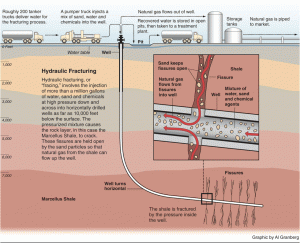By Amy Reumann, Director, Lutheran Advocacy Ministry in Pennsylvania
The federal budget matters…in order to preserve clean water in Pennsylvania where a new American gold rush is on. This time it is to mine natural gas trapped a mile underground between layers of shale rock, using a recently developed technology called hydraulic fracturing (or fracking). Fracking injects huge amounts of water mixed with sand and chemicals deep underground. This action breaks up rock formations and releases the gas which is then brought to the surface.
This new, domestic source of energy is hailed as a cleaner burning fuel and a bridge to more renewable sources. Gas drilling activities provide a boost to job creation and local economies. But the fracking process, which is currently exempted from the Safe Drinking Water Act, also carries significant environmental risks, particularly for water resources and quality:
- Fracking one well requires about 4 million gallons of water, either drawn from local waterways or trucked in to the site.
- Gas drillers are not required to disclose the chemicals they use in the fracking process. These may include substances known to be toxic to humans and wildlife, including carcinogens such as benzene.
- A well brings over a million gallons of the fracking water back to the surface. In addition to chemicals, it is often laced with corrosive salts and radioactive elements like radium found underground.
- Some fracking water remains underground, with ongoing debate as to the long term implications.
Pennsylvania sits atop the Marcellus Shale reserve. The state has welcomed drilling and its benefits, with over 3,300 drilling permits issued in 2010 alone. The state has been slow to evaluate the environmental costs and consequences. Impact on water resources includes:
- Pollution of rivers, including those that provide drinking water to Pittsburgh, Philadelphia, and Harrisburg. Pennsylvania is the only state that has allowed drillers to discharge much of their waste into rivers through local sewage treatment plants, which are not designed to remove drilling contaminants.
- Contamination of water wells in proximity to fracking sites.
- Spills and overflows of fracking waste water from holding ponds and during transport.
The drilling debate has been deeply polarized. Opinions for and against fracking both suffer from a lack of information based on solid research. The federal budget matters if we are to forge sound policy to protect and preserve clean water in Pennsylvania. A current EPA study of the impact of fracking on drinking water resources, which includes three Pennsylvania sites, is currently underway. Its findings will provide direction for the oversight of natural gas drilling, and the preservation of water resources in Pennsylvania and the entire nation.

